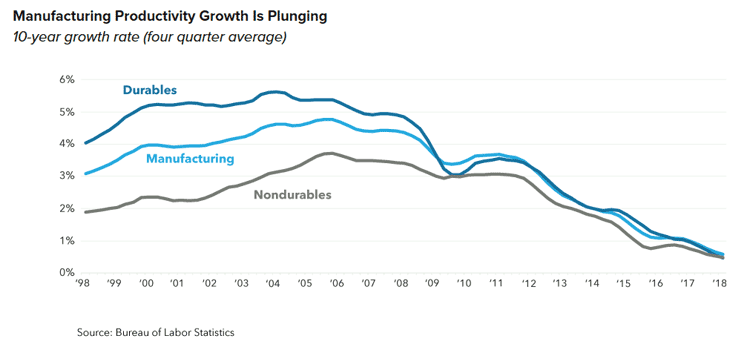US manufacturing is set to see a game changing transformation, driven by digital technology – and it is coming just in time.
So writes Dr. Michael Mandel of the Progressive Policy Institute in a major report on web site of MAPI, the Manufacturing Alliance, a research organization focused on manufacturing and which is consistent provider of interesting insight.
Supply Chain Digest Says... |
|
|
Manufacturing is not easy to "digitize," Mandel notes.
"For all of the catchphrases about Industry 4.0 and the fourth industrial revolution, the truth is that digitizing manufacturing is a long and difficult slog," Mandel says. "The issue is that engineers in manufacturing and other physical industries have to manipulate and fit together real-world materials in ways that are consistent with the laws of nature and the limitations of current technology."
He notes that many manufacturers have taken the first step towards digitization by putting sensors into existing products such as turbines, jet engines, and construction equipment, using the resulting data to improve performance – and perhaps turn the insights into new service revenue streams.
But it will take more than that revitalize US manufacturing, the strength of which is less than is often reported. SCDigest will note, for example, that the Federal Reserve's measure of US manufacturing output says the the country is currently still well below the peak year of 2007.
Real domestic manufacturing operating profits are also stalled at 2007 levels. What's more, the price of domestic manufactured goods is rising faster than the price of Chinese imports, as measured by the US Bureau of Labor Statistics (BLS), leading to a continued flood of imports.
Mandel notes that a recent report from the McKinsey Global Institute says that US manufacturing has experienced two "lost decades, " adding that significant productivity gaps have opened up between large firms and small and midsize producers that are unable to invest in new equipment and technologies.
The better news: manufacturing is finally starting to go more fully digital, and "is rapidly approaching the point where new business models and new markets will emerge" Mandel says.
He adds that "Digitization of production and digitization of distribution will lead to a renewed emphasis on local manufacturers, which will provide rapid response customization and distribution that foreign competitors cannot. Moreover, we are entering a new era of manufacturing platforms, both open and proprietary, which may boost global productivity and innovation in manufacturing."
Supply chains, Mandel notes, have mostly been built to take advantage of scale. In fact, the efficiencies of scale associated with standardized shipping containers means it is often cheaper to ship a single container from Shanghai to New York than to ship the same goods in small lots by truck from say Ohio.
(See More Below)
|
CATEGORY SPONSOR: SOFTEON |
|
|
| |
|
|
And for reasons that even economists can't well explain, US manufacturing productivity has plummeted, to almost flat levels in recent years, as seen in the graphic below. That slowdown impacts US competitiveness, the ability to increase wages, and more.

Source: MAPI
But, Mandel believes that advances in distribution technology introduced by Amazon are changing the economic equation.
"A technology designed to sort and ship packages to consumers efficiently can give industrial businesses the ability to ship individual items directly to customers without going through distributors" – and that would be a game changer indeed.
Mandel also believes the combination of robotics and 3D printing will also change the equation to enable companies to efficiently fulfill small-batch or custom production runs without incurring heavy retooling costs.
"That greatly expands the types of business models that are possible," Mandel notes.
He adds that the result will be "a thickening network of small-batch and custom factories taking hold around the country. The new business models will give a sustained competitive advantage against foreign competitors, because who wants to buy a custom item from a supplier 10,000 miles away that will take two months to arrive? This will enable the U.S. to rebuild its industrial networks in areas like the Midwest and upstate New York."
Mandel calls this the coming "Internet of Goods" – and we'll cover his thoughts on how we get there in Part 2 of this series.
Can you see a digital revolution that transforms much of US Manufacturing? Let us your thoughts at the Feedback section below or the link above to send an email.
Your Comments/Feedback
|